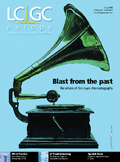Event News
ISC 2008 - the 27th International Symposium on Chromatography will be held from 21–25 September 2008 in Münster, Germany.
September 2008
ISC 2008 — A Forum on Separation Sciences
ISC 2008 — the 27th International Symposium on Chromatography will be held from 21–25 September 2008 in Münster, Germany.

Organized by the separation science working party of the German Chemical Society (GDCh) and GDCh's Congress Team. ISC 2008 is being chaired by Uwe Karst from the University of Münster and supported by the British Chromatographic Society (ChromSoc) and the French Association Francophone des Sciences Séparatives (AfSep).
ISC is the oldest series of scientific meetings devoted to the field of chromatographic science and was launched in London in 1956. It is an international forum for scientific discussion of all methods of chromatography, as well as complementary techniques such as electrodriven separations, coupling techniques with mass spectrometry (MS) or nuclear magnetic resonance (NMR) spectroscopy and microscale separations. The symposium is held biannually in different European countries.
Eminent figures in the international separation science sector will contribute to the symposium programme by giving plenary lectures on the most recent developments in their fields. ISC 2008 will have parallel sessions to cover a broad spectrum of chromatographic topics. including gas chromatography, column liquid chromatography, thin-layer chromatography, multidimensional chromatography, hyphenated techniques, chromatographic fundamentals, fast separations, column technology, electrodriven separations, microscale separations, supercritical fluid chromatography, enantioseparations, new detection methods, sample preparation, industrial and process chromatography, environmental applications, speciation analysis, chromatographic applications in food, clinical and pharmaceutical analysis, life-sciences applications, bioanalysis, forensic analysis, as well as the characterization of polymers.
There will also be poster sessions from young scientists presenting and discussing their results in a pleasant atmosphere.
A vendor exhibition will display the most recent developments in the fields of instrumentation, column technology, sample preparation, software tools and many other features related to separation sciences. Short courses, workshops and vendor seminars shall also be part of the symposium programme and will provide an excellent opportunity to learn about the most recent developments in all fields of chromatography.
After a hard day's work there will be time for relaxation in the evenings, including a symposium evening at Münster zoo, which is close to Lake Aasee, followed by a townhall reception in the historic centre of Münster. A series of "surprise" events will be revealed at the opening of ISC 2008.
The deadline for last-minute poster submissions and early-bird registration is 31 July 2008! Abstract submission and symposium registration can be made on www.isc2008.de
E-mail: isc2008@uni-muenster.de
Website: www.isc2008.de
14–17 September 2008
International Conference on Polyolefin Characterization (ICPC)
The Westin Valencia, Amadeo de Saboya, 16 46010 Valencia, Spain
Contact: Raquel Ubeda
E-mail: Raquel.ubeda@icpc-conference.org
23–25 September 2008
Analytica China
Shanghai New International Expo Centre (SNIEC), Shanghai (Pudong), China
Organizers: Messe München GmbH, IMAG and SNIEC
Contact: Claudia Weidner
E-mail: weidner@imag.de
20–22 October 2008
LABTECH Conference & Exhibition 2008
The Gulf International Convention and Exhibition Centre, PO Box 580, Kingdom of Bahrain, Manama, Bahrain
Organizers: Saudi Aramco Co., ACS,
SAICSC-ACS and Bahrain Society of Chemists
Contact: Yaser Sonbul
Address: Saudi Aramco Co., Box# 7010,
N/A Ras Tanura, 31311, Saudi Arabia
E-mail: vaser.sonbul@aramco.com
12–14 November 2008
25th LC–MS Montreux Symposium
The Montreux Convention Centre,
Grand Rue 95, CH-1820 Montreux, Switzerland
Organizer: IAEAC
Contact: Marianne Frei, secretary
Address: Postfach 46, CH-4123 Allscheil 2, Switzerland
Tel: +41 61 481 27 89
Fax: +41 61 482 08 05
E-mail: iaeac@dplanet.ch
Send your event details to fthomas@advanstar.com

.png&w=3840&q=75)

.png&w=3840&q=75)



.png&w=3840&q=75)



.png&w=3840&q=75)











